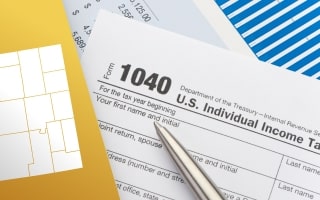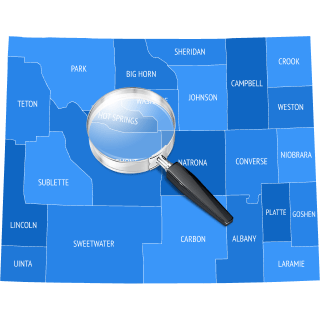Property Tax Records in Wyoming

When you purchase any type of property in Wyoming, you must pay taxes on it. Property taxes will be collected by the county your home is located in every year. Homeowners in Wyoming benefit from low property taxes. The average tax rate is just 0.55%, which is nearly half the national average of 0.99%. The median property tax payment is around $1,450 per year. At this amount, your monthly mortgage payments would increase by around $120.
Your taxes are determined by the tax rate in your county and the assessed value of your home. Once an assessor appraises your home, they'll be able to use the local tax rates to calculate how much you'll pay for the year. You should receive your tax bill around September 1.
While homeowners have the opportunity to pay their taxes in full, Wyoming allows these bills to be spread out over two installments. The first installment is due immediately but doesn't become delinquent until November 10. If you pay in multiple installments, the second half of your taxes must be paid by May 10. When paying in full, the tax bill is due by the end of December.
Along with low property taxes, Wyoming residents don't need to pay a state income tax. When Wyoming became a state in 1890 and drafted a constitution, it created numerous property tax laws. At first, properties were taxed at 100% of their market value. This rule was altered in 1900 to ensure that property taxes weren't too high.
Property Tax Assessment in Wyoming

Your annual property taxes are calculated based on factors like the current value of your home and the tax rate in your county. Keep in mind that tax rates differ from county to county and often depend on the annual budget for each district.
Property taxes in Wyoming are well below the national average because of how properties are assessed. If a property is being used for any type of mineral production, it will be assessed at 100% of its current market value. In comparison, residential homes are assessed at 9.5% of their current market value.
The current value of your home will be calculated every six years by a local assessor. To perform this valuation, the assessor must physically visit your home.
However, property valuations are still updated annually by the county. If your local real estate market experienced a substantial increase in property values over the past year, your home's assessed value might be changed to reflect the new conditions. If the value of your property changes, this will occur on January 1.
Your notice of assessment should be mailed to you in April. This document includes your home's market value and its assessed value.
Every county in Wyoming consists of multiple taxing districts, which can include cities, towns, and school systems. Each district sets its own tax rate that's eventually combined into a single one that the county applies to real estate. These tax rates are displayed as mills. A single mill is equivalent to $1 in tax for each $1,000 in the assessed value. Let's say that your home has a market value of $200,000 and an assessed value of $19,000. If the mill rate in your county is 65, your annual tax bill will be $1,235.
Based on Wyoming state law, mill rates are restricted in counties, school districts, and cities. For example, the county district can only levy a rate of 12 mills or less. In comparison, cities have a limit of eight mills.
You're also able to estimate your annual property taxes by using your county's effective tax rate. The effective tax rate in Sublette County is 0.47%. When you apply this percentage to your home's market value of $200,000, you'll need to pay annual property taxes of $940. The effective tax rates in the most populous Wyoming counties are:
- Laramie County: 0.69%
- Natrona County: 0.67%
- Campbell County: 0.59%
- Sweetwater County: 0.64%
- Fremont County: 0.70%
As you can see, Laramie County property taxes are among the highest in the state. However, even considering that property taxes in Wyoming are generally much lower than in the rest of the country.
Calculate Wyoming Taxes
It is wise to use a property tax calculator to better understand how property taxes are calculated in Wyoming. This tool simplifies the process for both homeowners and real estate investors by allowing users to input key property details and estimate their tax assessment and annual liability based on local rates. In Wyoming, property taxes are determined at the county level, with rates varying by location.
A Wyoming property tax calculator can provide a clearer picture of your tax responsibilities while also helping identify potential exemptions and tax relief programs. These may include the Senior Citizens Property Tax Discount, which offers a reduction for homeowners aged 65 or older, and various local exemptions for veterans or low-income homeowners. The calculator is a helpful tool for estimating these savings and understanding your full tax obligations based on your specific location and situation.
using our property tax calculator.
Wyoming Property Tax Records: What Are They?

Property taxes serve as one of the main sources of revenue for counties, cities, towns, water districts, sewer districts, and local governments. These districts often use the funds to pay for public services, which means that the taxes you pay every year should help improve your quality of life.
If you're about to make an offer on a property but want to learn more about it, you can find the most relevant details in tax records. These records are available to the public and accessible through online databases. Your county should offer access to this database on the government's website. These Wyoming property tax records contain the latest information about the amount of taxes that are collected on the property. They also include the following details:
-
Property address
-
Owner name
-
Account type
-
Tax district
-
Mill levy
-
Parcel number
-
Acreage
-
Legal description
-
Market value and assessed value
-
Architectural style
-
Details about the HVAC system
-
Year built
-
Accessory building information
Property Tax Exemptions and Deductions in Wyoming

Regardless of the type or value of the property you own, your taxes shouldn't be that high. There are, however, ways that you can further reduce these taxes. Wyoming provides homeowners with several deductions and property tax exemptions for which they can apply.
If you qualify for an exemption, you may be able to reduce your home's current assessed value, which will limit the amount of taxes you owe for the year. Each exemption comes with a different due date.
Veteran's Property Tax Exemption: This exemption is available to many veterans. If you served during WWI, WWII, Korea, or Vietnam, you'll qualify as long as you were honorably discharged. The same is true of honorably discharged veterans who received a campaign medal or armed forces expeditionary medal. Veterans who qualify must apply by the fourth Monday in May. Your home's assessed value will be reduced by $6,000.
Property Tax Refund: This refund is available to low-income individuals in Wyoming. The application must be filled out and submitted by the first Monday in June. If your household income is lower than 145% of the state or county median household income, you might qualify.
Your household assets must not be worth more than $156,900 per adult household member. To qualify, you'll need to live in Wyoming for five years. This refund is worth up to 75% of your property tax bill.
How To Search Property Tax Records in Wyoming

When you wish to obtain tax and deed records for a specific property, there are a few resources available to you. For example, you should be able to access this information on your county assessor's website. Most counties in Wyoming provide the public with online databases that make it easy to search for tax records and other information. The Natrona County database allows you to search for these records with queries like property address, owner name, account number, legal description, or parcel ID.
If you're having difficulty finding this information, consider using a third-party solution like PropertyChecker. This website allows you to search for up-to-date records on all properties in Wyoming. All that's needed to obtain these records is an address, the owner's name, or a parcel ID. After inputting the right information, you'll receive the following details about the property:
-
Deed records, which include the terms of the sale
-
Owner names
-
Previous sales history
-
Loan records, including rates, amounts, and terms
-
Current market and assessed values
-
Property details like bathroom and bedroom count, square footage, and renovation history
-
Property tax records
-
Comprehensive foreclosure records
-
Building permit
-
Lien records
How To Appeal Property Taxes in Wyoming

When you receive your annual property tax bill or Wyoming property tax assessment notice, the valuation of your property will likely be accurate. However, this isn't always the case. Assessors often perform mass appraisals that rely on data within the county to determine the likely value of each home. If the assessor makes a mistake, the market value of your home may increase by an amount that isn't reasonable. When this happens, you'll have the option of filing an appeal.
Step 1: You must appeal to the county assessor within 30 days after you receive your assessment notice. Make sure you include evidence that supports your estimation of the home's market value. The County Board of Equalization will hold a hearing that will consider your arguments.
Step 2: If you disagree with the County Board's decision, you can apply directly to the State Board of Equalization. You must file your appeal within 30 days after the County Board makes its decision.
Step 3: You should receive the State Board's decision by the first Monday in October. There are no further appeals available. If you don't win this portion of the case, you can't appeal again until you receive another assessment notice.
How Property Tax Records Impact Real Estate Transactions in Wyoming

When you buy, sell, or invest in a home, you need to consider how property taxes will impact the transaction. While Wyoming property taxes aren't that high, they can still add a couple hundred dollars to a buyer's mortgage payments every month.
Let's say that you want to buy a home in Teton County. The effective tax rate is just 0.47%. On the other hand, the median home value is $850,000. When you're calculating what you can afford, make sure you include property taxes in your estimations. If the home costs $850,000, your annual property taxes will be $3,995, which will cause your monthly mortgage payments to increase by $333.
If you're selling a home in Wyoming, property taxes shouldn't have a significant impact on the transaction. While buyers may be wary about purchasing homes in counties that have high property taxes, the highest effective tax rate in Wyoming is just 0.72%. However, some buyers still consider taxes when making offers on homes, which is why it's a good idea to price your home competitively.
Property taxes are often crucial in helping investors determine which rentals they should buy. An investor must calculate how much their monthly payments will increase when accounting for property taxes. After performing this calculation, they can set a rental price that allows them to earn profit every month. When researching rental homes to buy in Wyoming, investors in Wyoming regularly obtain property tax records to learn more about the rentals and how they might perform.
It's also common for investors to purchase real estate through tax sales, which most counties hold once every year. These public auctions can occur at different times depending on the county. In Teton County, the annual tax sale is usually held in early August.
If you don't pay your property taxes in full when they're due, they will become delinquent. When your property taxes become delinquent, your county will place a tax lien on your property. This lien indicates that the county has some control over the property and will be able to collect the amount of taxes that they're owed if you sell the home.
Counties can choose to either hold onto the lien or sell it to an investor at a public auction. If an investor buys the lien certificate on your home, they'll be able to collect taxes and interest. You'll have a four-year redemption period to repay all the taxes you owe.
After this period, the lien purchaser could take full ownership of your home. They'll have two years to do so. This process involves applying for a tax deed from the local treasurer. If the county still holds the lien certificate, they can sell the property at auction. The holder of the lien could also choose to foreclose on the property to satisfy the remaining debt.
Free Wyoming Property Tax Lookup
Tax Records Please wait...
Property Tax Guide
- Property Tax Records in Wyoming
- Property Tax Assessment in Wyoming
- Wyoming Property Tax Records: What Are They?
- Property Tax Exemptions and Deductions in Wyoming
- How To Search Property Tax Records in Wyoming
- How To Appeal Property Taxes in Wyoming
- How Property Tax Records Impact Real Estate Transactions in Wyoming
Instant Access to Wyoming Property Records
- Owner(s)
- Deed Records
- Loans & Liens
- Values
- Taxes
- Building Permits
- Purchase History
- Property Details
- And More!
Free Wyoming Property Tax Lookup
Tax Records Please wait...
Property Tax Guide
- Property Tax Records in Wyoming
- Property Tax Assessment in Wyoming
- Wyoming Property Tax Records: What Are They?
- Property Tax Exemptions and Deductions in Wyoming
- How To Search Property Tax Records in Wyoming
- How To Appeal Property Taxes in Wyoming
- How Property Tax Records Impact Real Estate Transactions in Wyoming